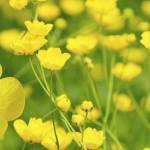Forage Shortages and Weed Toxicity in Horses

Though they generally seek out nutritious, palatable plants, horses are inquisitive and will sample an array of vegetation if available, some of which is less than wholesome.
“Many wild and decorative plants contain toxins. As forage resources run low, whether it’s pasture or hay supply, horses are more tempted to nibble on plants that otherwise wouldn’t be enticing,” warned Kathleen Crandell, Ph.D., a nutritionist for Kentucky Equine Research (KER).
One such catastrophe recently happened at an equine operation in Australia when four horses grazed on marsh mallows* (Malva parviflora), a common weed found on at least five continents. Other names for this plant include small-flowered mallow, little or least mallow, and cheeseweed. Previous reports suggest that horses ingesting marsh mallow suffer from staggers-like symptoms.
In the aforementioned case, four horses residing in a pasture flush with marsh mallow, but lacking other natural forage, were offered supplemental forage. After this forage was suddenly decreased to 0.5% of their body weight per day, the horses were presumably forced to graze marsh mallow. Within a week, the horses began showing signs of colic, muscle fasciculation, frequent vocalization, and abnormal sweating. All horses either died or were humanely euthanized, and necropsies revealed muscle degeneration in both the heart and skeletal muscles.
“Horse owners can consult their local equine extension specialists for assistance identifying potentially toxic plants and to find affordable forage options. When hay shortages do occur, alternatives are available, including complete feeds, hay cubes, cut hay, chaff, and even beet pulp and soybean hulls,” shared Crandell.
For more assistance, schedule a one-on-one consultation with a KER equine nutritionist.
*Bauquier, J., A. Stent, J. Gibney, et al. Evidence for marsh mallow (Malva parviflora) toxicosis causing myocardial disease and myopathy in four horses. Journal of Equine Veterinary Science. In press.








